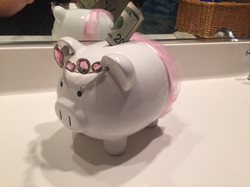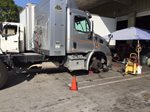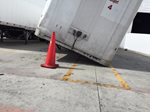 One time or another as a driver you will more than likely hear the phrase “big trucks = big bucks” being tossed around somewhere. I can attest that in my years of experience, nothing could be truer! Our trucks are often seen as big rolling piggy banks and it takes a lot of the “green stuff” to operate these big pieces of rolling machinery, whether they are new or old. With higher expenses on average than many other industries out there, it is no wonder why only 15% of small start-up trucking companies ever make it to their second year of business, according to NASTC. Just looking at an average truck’s fuel bill for the year would be enough to make most non-trucking folk take a step back and think “Whoa!” Do not let this negative, intimidating figure of failure fool you into believing the hype out there that, “there’s no money to be made in trucking these days". In planning for the unexpected, you are one step closer to proving staggering statistics like this wrong.
One time or another as a driver you will more than likely hear the phrase “big trucks = big bucks” being tossed around somewhere. I can attest that in my years of experience, nothing could be truer! Our trucks are often seen as big rolling piggy banks and it takes a lot of the “green stuff” to operate these big pieces of rolling machinery, whether they are new or old. With higher expenses on average than many other industries out there, it is no wonder why only 15% of small start-up trucking companies ever make it to their second year of business, according to NASTC. Just looking at an average truck’s fuel bill for the year would be enough to make most non-trucking folk take a step back and think “Whoa!” Do not let this negative, intimidating figure of failure fool you into believing the hype out there that, “there’s no money to be made in trucking these days". In planning for the unexpected, you are one step closer to proving staggering statistics like this wrong.
 One major key to succeeding is identifying, planning for, and managing large expenses “smartly”, both seen and unforeseen. Knowing exactly what your expenses are and being prepared for them can easily be the tipping point between your venture booming or busting. First rule for new owner operators; the money left after you pay your fuel and insurance is not your new source for personal spending money! Soon enough, operating in this manner will catch up to anyone
One major key to succeeding is identifying, planning for, and managing large expenses “smartly”, both seen and unforeseen. Knowing exactly what your expenses are and being prepared for them can easily be the tipping point between your venture booming or busting. First rule for new owner operators; the money left after you pay your fuel and insurance is not your new source for personal spending money! Soon enough, operating in this manner will catch up to anyone  who chooses to go down this path. All it takes is a blown turbo, one bad injector, or blown tire to wipe out a trucking business operating with no buffer for maintenance. If a $1000 setback could do this to an unprepared owner-operator, imagine what a $3000-$4000 set of tires or a $3000 quarterly tax estimate might do!
who chooses to go down this path. All it takes is a blown turbo, one bad injector, or blown tire to wipe out a trucking business operating with no buffer for maintenance. If a $1000 setback could do this to an unprepared owner-operator, imagine what a $3000-$4000 set of tires or a $3000 quarterly tax estimate might do!
 Drivers that operate without knowing exactly what their expenses are can usually plan on ending up on the negative side of a trucking statistic. Having a good business plan is the first line of defense in protecting against this kind of failure. Know what will happen and then plan for what might happen! My own personal experience has taught me to set aside 10% of my gross earnings to plan for these types of unforeseen maintenance expenses, which of course will vary for everyone based on their specific operation. As an example I know that when I was in the rock and sand industry, the off-road driving was harder on the trucks and trailers, so a lot more was spent on unexpected maintenance as a result. If you’re not used to setting aside these funds at first, it can seem like a large part of what you thought was your "profit". When the time comes that you actually need it though, you will be more than glad it is there to keep your truck up and rolling! As Winston Churchill once said, "He who fails to plan is planning to fail."
Drivers that operate without knowing exactly what their expenses are can usually plan on ending up on the negative side of a trucking statistic. Having a good business plan is the first line of defense in protecting against this kind of failure. Know what will happen and then plan for what might happen! My own personal experience has taught me to set aside 10% of my gross earnings to plan for these types of unforeseen maintenance expenses, which of course will vary for everyone based on their specific operation. As an example I know that when I was in the rock and sand industry, the off-road driving was harder on the trucks and trailers, so a lot more was spent on unexpected maintenance as a result. If you’re not used to setting aside these funds at first, it can seem like a large part of what you thought was your "profit". When the time comes that you actually need it though, you will be more than glad it is there to keep your truck up and rolling! As Winston Churchill once said, "He who fails to plan is planning to fail."